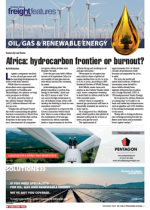There has been a significant uptick in the reactivation of oil rigs poised for deployment on fresh contracts across the globe. This is good news for South Africa as the country is often a preferred location due to its accessibility to a range of services in the engineering sector, ranging from marine services, specialised oil and gas engineering solutions, and dependable project logistics.“The demand from our clients is clear,” said Howie Frylinck, general manager at Pentagon Freight. “They expect us to deliver top-notch, turnkey solutions in southern Africa, meeting their standards and expectations consistently.”He highlighted that the positive signals weren't limited to the oil and gas sector. Ongoing tenders and pricing discussions for wind farms and solar plant projects are currently widespread. "Recently, we've noticed a heightened sense of urgency from renewable energy developers and wind farm operators. They are actively participating in high-level discussions, indicating that we are nearing the final planning phase and moving closer to implementing new wind farms."He pointed out that regarding the oil and gas sector, the primary challenges persist in dealing with diverse customs regimes, where customs authorities may not always grasp the nature, description, and usage of the commodities. "From a logistical standpoint, challenges arise in the routing of carriers, dealing with limited weights, dimensions, and available space. When it comes to the reactivation or mobilisation of oil rigs, identifying suitable ports and services can pose significant challenges. Finding the right fit that aligns with the scope, cost, and schedule of the drilling contractor and their subcontractors can be a complex task. Therefore, it is crucial to initiate consultations with all parties involved right from the start to identify and implement suitable solutions."Another challenge lies in the fact that oil and gas discoveries are frequently located in remote areas where nearby ports and airports face difficulties handling the volumes, or carriers do not provide direct services."In the renewable sector, transporting abnormal and oversized cargo over long distances is a substantial undertaking, and locating the right equipment can be problematic. The industry is further constrained by limitations in available ports, port infrastructure, and laydown areas."Frylinck emphasised that the push towards greener energy continued to be a driving force in the development of wind farms and solar plants, leading to an automatic increase in logistical activities."The demand for energy on the African continent, coupled with the sustained global supply, ensures the continuous exploration and movement of rig equipment and spares. This trend will persist until the point when there is a definitive shift from fossil fuels to greener energy sources."

